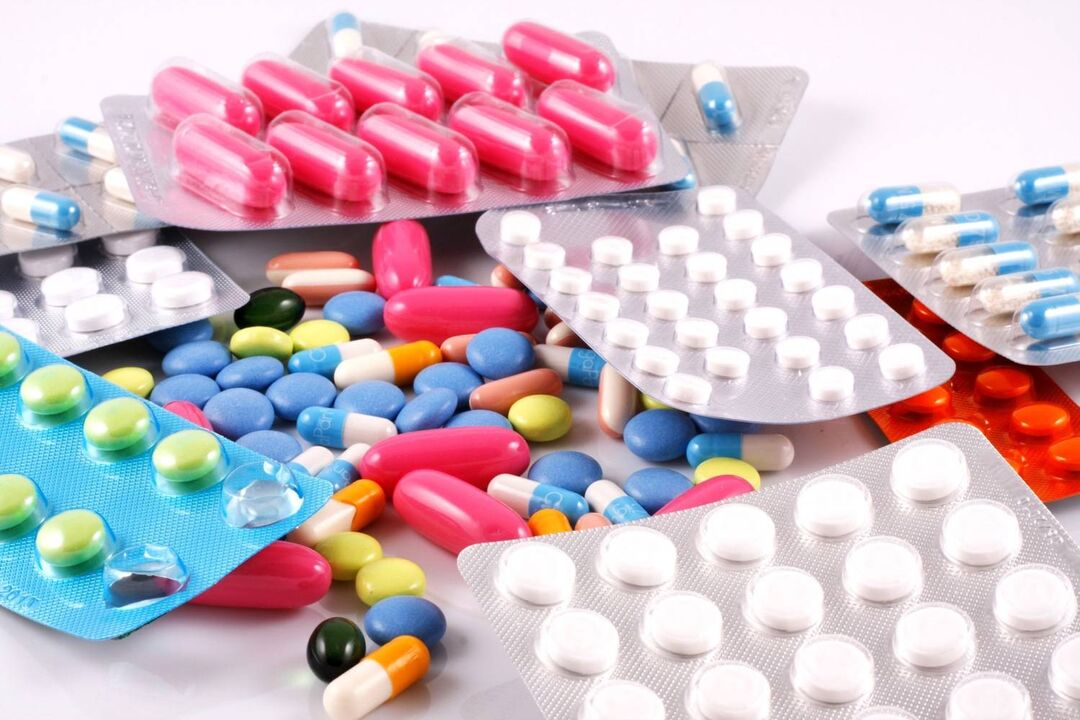The initial stages of prostatitis are characterized by mild symptoms. The patient usually feels mild pain in the groin, perineum or lower back. With the development of the disease, the pain syndrome gradually increases and intensifies.

With the disease, acute cramping pain is observed, in which there is a violation of the urinary process, and the urge to do so becomes frequent and unreasonable. When observing such symptoms of prostatitis in itself, it is necessary to consult a specialist as soon as possible. For each patient, the urologist prescribes an individual course of treatment, however, as a rule, it is based on taking medication.
Effective pills for prostatitis
Antibacterial therapy
Antibiotics are the doctor's first choice for treating this disease. Antibacterial drugs are prescribed depending on the causative agents of the disease, which are determined by a special diagnostic procedure - bacterial culture. With severe pain syndromes, antibacterial drugs can be administered to the patient intravenously. Usually the course of taking antibiotic therapy is from 4 to 6 weeks.
Alpha blockers
Preparations from this group are suitable for those men who have urinary disorders. Alpha-blockers relax the muscles of the prostate and bladder, which facilitates the act of urination.
The course of treatment with such drugs is at least six months. The course should be performed strictly to the end, even if the patient's health has improved earlier.
Painkillers
This group of drugs makes life easier for many patients. However, their dosage should be clarified with your doctor.
soothing
Due to the fact that due to the violation of the quality of daily life and sex, many men are in a state of deep depression, the attending physician may use sedatives in the treatment. In this case, the urologist should carefully monitor the patient's mental state. Mostly male valerian is recommended. In severe cases, men may need the help of an experienced psychotherapist.
Hormonal drugs
This group of drugs aims to reduce the level of the male hormone - testosterone, which stimulates the growth of prostate tissue. When you take these medications, a man's overall hormonal background stabilizes and the symptoms of prostatitis are reduced.
Phytotherapy
These are groups of medicines based on natural medicinal herbs. The spectrum of action of these drugs is versatile and depends mainly on the doctor's prescription. As a rule, phytopreparations are taken in combination with the main treatment, which greatly facilitates the course of the disease, relieves acute symptoms and inflammation.
vitamins
Taking vitamins is necessary to strengthen the body's immune system, which suffers greatly during prostatitis. The chronic course of the disease greatly affects a person's protective functions, so vitamins are taken in combination with the main drug therapy.
Treatment options for each stage of prostatitis
For acute bacterial
The cause of the disease in this form are bacteria from the group of Escherichia coli. Staphylococci, chlamydia, streptococci, and anaerobic bacteria can sometimes be seen in prostate secretions. In this case, taking antibacterial drugs is a key moment in treating the disease. As a rule, drugs from the fluoroquinolone group are prescribed. Patients at risk of genital bacteria should also be treated against chlamydia.
With a chronic bacterial form
The effectiveness of antibiotic therapy in this form of prostatitis is significantly reduced. This is due to the inability of many tablets to penetrate the prostate epithelium during its inflammation. The cause of the chronic bacterial form of the disease, as a rule, are the bacteria chlamydia, ureaplasma and mycoplasma. They usually heal within a few weeks.
Against non-bacterial form
Experts have found that after taking antibiotics, the signs of pain syndromes disappear. Therefore, doctors prescribe patients a course of antibacterial drugs, even if no infection was detected at the time of diagnosis.
If the disease is resistant to treatment, then the patient is prescribed a course of taking alpha-blockers, which fight the main cause of non-bacterial prostatitis - the return of urine to the prostate ducts.



























